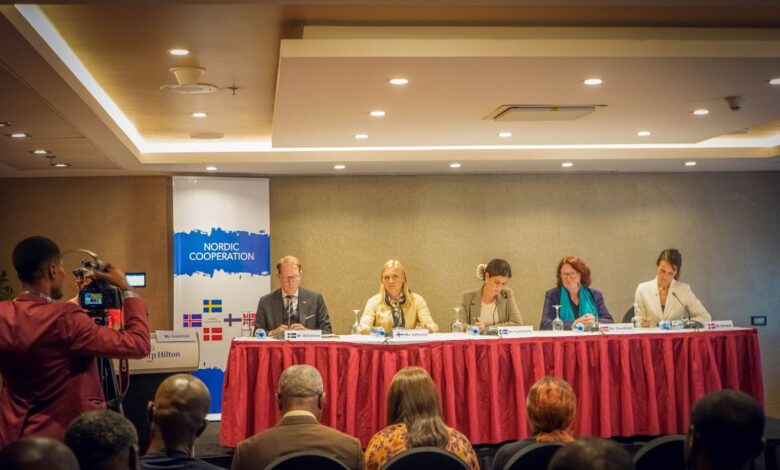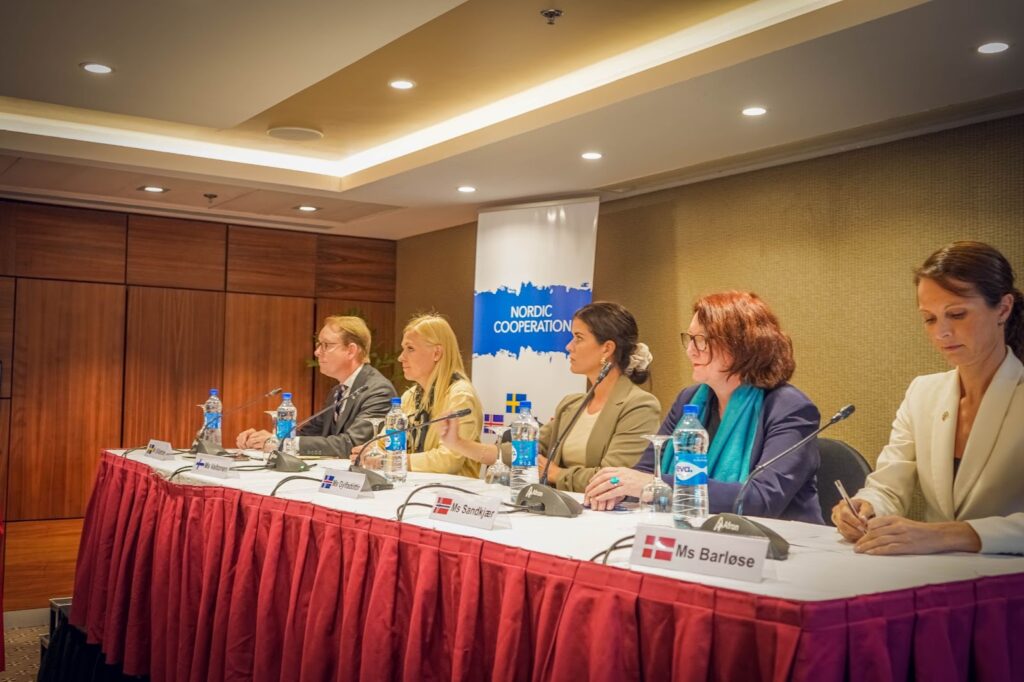Nordic Countries Restate Commitment To Fostering Peace And Development In Nigeria
During a recent visit, Finland’s Foreign Affairs Minister expressed the country’s commitment to working closely with Nigerian authorities to address mutual concerns about the operations of non-state armed groups in the southeastern region.

Foreign ministers from the Nordic countries of Denmark, Finland, Iceland, Norway, and Sweden have stressed their governments’ commitment to strengthening partnerships with Nigeria in peacekeeping, trade, education, sustainable development, and addressing disinformation.
The ministers declared this at a press briefing in Abuja on Tuesday, Aug. 13, during a first-of-its-kind joint visit outside Europe.
“The Nordic countries have a long tradition of taking part in international trade, and we believe in forging strong economic ties as a means of long-term development. My country, Sweden, is an example of this. Our journey from poverty to prosperity would not have been possible without free trade and economic immigration,” said Tobias Billström, Sweden’s Foreign Affairs Minister.
“The Nordic countries and Nigeria have long-standing traditions and a strong partnership that dates back more than 60 years, half a century. And this visit to Nigeria is of particular importance to us,” he added. “Nigeria is not only one of our largest trading partners in Africa but also a steadfast ally in upholding international law and addressing global challenges, including climate change, and countering the spread of violent extremists in Africa.”
According to Billström, the delegation held meetings earlier in the day with the Nigerian government, ECOWAS Commission, and civic society actors to discuss regional and global security, democracy, human rights, and the reformation of multinational institutions.
A recurring theme during the press briefing was the emphasis on collaboration with Nigeria to promote peace and security.
“It is clear that Nigeria and the Nordic countries see eye to eye on many of the most important issues of the day, such as the importance of peace and security,” said Thórdís Kolbrún Reykfjörd Gylfadóttir, Iceland’s Minister for Foreign Affairs.
The Nordic countries have historically invested heavily in supporting peace and mediation initiatives in Africa, having pledged $4.96 billion in funding support for security efforts between 2012 and 2021.
“What shows from our part also how important it is to attach special focus to stability and prosperity is that those indeed go hand-in-hand,” observed Elina Valtonen, the Minister for Foreign Affairs of Finland.
When questioned about the unrest in southeastern Nigeria and the involvement of Finnish national Simon Ekpa, Valtonen said they were cooperating with the Nigerian government and hoped to resolve the issue soon.
“Indeed, we have taken this up and discussed it with the Nigerian authorities in full collaboration. And the entire process is within our judicial system,” she stated.
“In Finland, we operate very strictly by the rule of law such as we see that Nigeria is doing as well. It is not a political question, but it is a question to the judicial system, and both our judicial systems do collaborate on this matter.”
Ekpa, the self-styled Prime Minister of the Biafra Republic Government in Exile (BRGIE), leads a more violent faction of the Indigenous People of Biafra (IPOB), a group seeking the secession of the southeastern and south-southern parts of Nigeria. He is based in the Lahti region of Finland, from where he declares curfews in Nigeria and incites violence against security forces. Nigeria’s defence chief and federal lawmakers have all appealed to the Finnish government to support efforts to extradite Ekpa.

The Nordic foreign ministers further highlighted opportunities for partnership in the energy and development sectors.
“The rapid global development in these areas highlights the need for both creative and sustainable solutions, and the Nordic countries together offer groundbreaking technology and innovation within various sectors for a greener and more sustainable future,” said Billström.
Trade was another key topic of discussion. “For Iceland, Nigeria is the 15th biggest importer, and that is mainly almost only in fish, but we have many other opportunities in other fields,” said Gylfadóttir.
Bjørg Sandkjær, Norway’s State Secretary for International Development, echoed the sentiment, emphasising the potential for more diverse economic relations.
“I would like to underscore collaboration within the area of energy. We have experience in renewable energy in Norway. We have companies who would like to invest and we also have experience that we would like to share both in terms of technology and also around the importance of having a conducive environment for investments to take place,” she said.
Eva Marie Frida Barløse, Denmark’s Under Secretary for Foreign Policy, announced that her country would launch a new strategy to guide its engagement with Africa in a few weeks, noting that one of the focuses will be equal partnerships in trade and investment.
She added, “We recognise the need for a reformed international architecture with a much stronger voice for Africans. And as Denmark takes up our seat in the Security Council on the 1st of January next year, this will be one of our top priorities as well.”
Support Our Journalism
There are millions of ordinary people affected by conflict in Africa whose stories are missing in the mainstream media. HumAngle is determined to tell those challenging and under-reported stories, hoping that the people impacted by these conflicts will find the safety and security they deserve.
To ensure that we continue to provide public service coverage, we have a small favour to ask you. We want you to be part of our journalistic endeavour by contributing a token to us.
Your donation will further promote a robust, free, and independent media.
Donate HereStay Closer To The Stories That Matter




